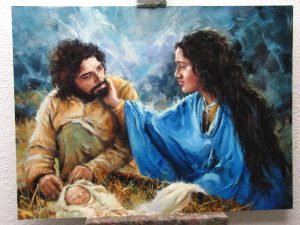A gift undeserved
Christmas is upon us, a time when Christians around the world celebrate the birth of the only Son of God. As it often does, curiosity compelled me to investigate the etymology—the history, origin, form, and meaning—of the word “Christmas”. I am fully aware that I am one of a very small number who might find this of even the slightest interest, but please bear with me for a moment.

Child born of Mary
“Christmas” comes from the phrase “Christ’s Mass”, a derivation of the Middle English Cristemasse. The first recorded phrase, Crīstesmæsse, was from the Old English in the year 1038, but less than a century later (1131), the word Cristes-messe had replaced it. Crīst (genitive Crīstes) is from the Greek Khrīstos (Χριστός), a translation of the Hebrew Māšîaḥ (מָשִׁיחַ), “Messiah”, meaning “anointed”; and mæsse is from the Latin missa, the celebration of the Eucharist. The word “Mass” is derived from the Latin, meaning “to dismiss” or “send forth” and “Eucharist” is from the Greek eucharistia which means “gratefulness” or “thanksgiving”.
Christmas, or Christ’s Mass, is special. It is with eucharistia (gratefulness and thanksgiving) that we ought to give pause to acknowledge and celebrate that most holy of days when God, through his unbounded love, sent forth the undeserved gift of his only son, the Christ child, to save us all from our sinfulness.
Christmas is, or should be, all about Christ. But sadly, Christ has become but an afterthought for many and for some, no thought at all. Increasingly we hear “Happy Holidays”, a phrase meant to include everyone without fear of offending anyone. Personally, I find that bland phrase to be quite offensive. Even more, I find it to be trite, divisive, and even sacrilegious, but then I am but one “voice crying out in the desert.”[1]
How did Christmas become just another holiday? When did we stop celebrating the birth of Christ? When did we forget the true meaning of Christmas?
One-hundred and forty-four years ago, on June 28th, 1870, President Ulysses S. Grant signed a bill that made Christmas Day, along with January 1st and July 4th, holidays within the District of Columbia, and in effect, federal holidays for the nation. Well-meaning as this may have been, the immediate result was, with the simple stroke of a pen, to make Christmas a public, secular holiday on par with all national holidays.
And once again, there was no room in the inn for Christ.
Customarily, the Christmas season begins the day after Thanksgiving. From then until Christmas Day we are bombarded with messages to shop and buy while listening to seasonal songs, surrounded by images of winter wonderlands, Santa Claus, and happy times. Absent from the public square are any images which might suggest the true reason for the season. Christ and God have been anathematized, banned from public view.
Gift-giving at Christmas is as old as Christmas itself. God gave us the greatest gift, the undeserved gift of himself, through his only son, Jesus Christ. Jesus gave us the salvific gift of his life. The Magi gave Jesus gifts of Frankincense, Gold, and Myrrh. What gifts do you bring to set before your God and King?
So, for this Christmas and for all Christmas’s yet to come, let Christ be in your heart and on your lips. Have a blessed Christmas everyone!
[1] Jn 1:23.
